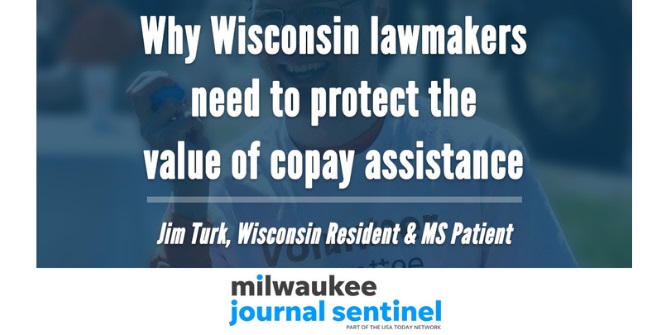
Op-Ed Outlines the Value of Copay Assistance and the Challenges of Copay Accumulator Adjustment Programs
A recent op-ed in the Milwaukee Journal Sentinel by Jim Turk, titled Why Wisconsin Lawmakers Need to Protect the Value of Copay Assistance, focuses on the challenges he faces with his health insurance coverage and copays for his ongoing treatment for Multiple Sclerosis (MS). MS is a chronic, potentially disabling disease of the brain and spinal cord (central nervous system), in which the immune system attacks the protective sheath (myelin) that covers nerve fibers causing potentially permanent damage or deterioration of the nerves.
Like patients with bleeding disorders, Jim relies on copay assistance to access critical medications for his ongoing treatment. Copay assistance helps patients with chronic illnesses, like MS or a bleeding disorder, afford and access their medications, especially when no other options exist. A copay accumulator – or accumulator adjustment program – is a strategy used by insurance companies and Pharmacy Benefit Managers (PBMs) that stop manufacturer copay assistance coupons from counting towards two costs: 1) a patient’s deductible and 2) a patient’s maximum out-of-pocket spending.
The problem, as Jim points out, is that in recent years more health plans in Wisconsin have changed their insurance policies to NOT count copay assistance towards a patient’s actual treatment co-pay, annual deductible or other out-of-pocket expenses – essentially allowing insurance companies to “double dip.” Jim’s op-ed states that, “In policy terms, it’s called a copay accumulator adjustment program. In layman’s terms, it often forces a patient to make a difficult decision about their medical condition and their finances – often on a whim.” Further complicating the issue, Jim points out that nearly four out of five brand name medications with available copay assistance don’t have a generic equivalent option for patients.
In 2021, as part of Great Lakes Hemophilia Foundation’s (GLHF) ongoing advocacy efforts, we met with national legislators for the National Hemophilia Foundation’s (NHF) annual Washington Days advocacy event in Washington, D.C., as well as our state legislators and representatives for Wisconsin Legislative Days in Madison, WI – advocating for support for the bleeding disorders community – including copay accumulator adjuster programs. We asked our elected officials to make sure that #AllCopaysCount!
We encourage you to read Jim’s op-ed. Although Jim’s story focuses on his struggles with health care coverage issues specific to his MS, people with bleeding disorders face many of the same challenges and roadblocks. In addition, consider contacting your legislators and elected officials directly to ask that #AllCopaysCount for patients. Find your legislator(s) here. For information about Wisconsin Legislative Days and Washington Days, visit our website. Learn more about copay accumulators in this video titled The State of Copay Accumulator Adjustment.